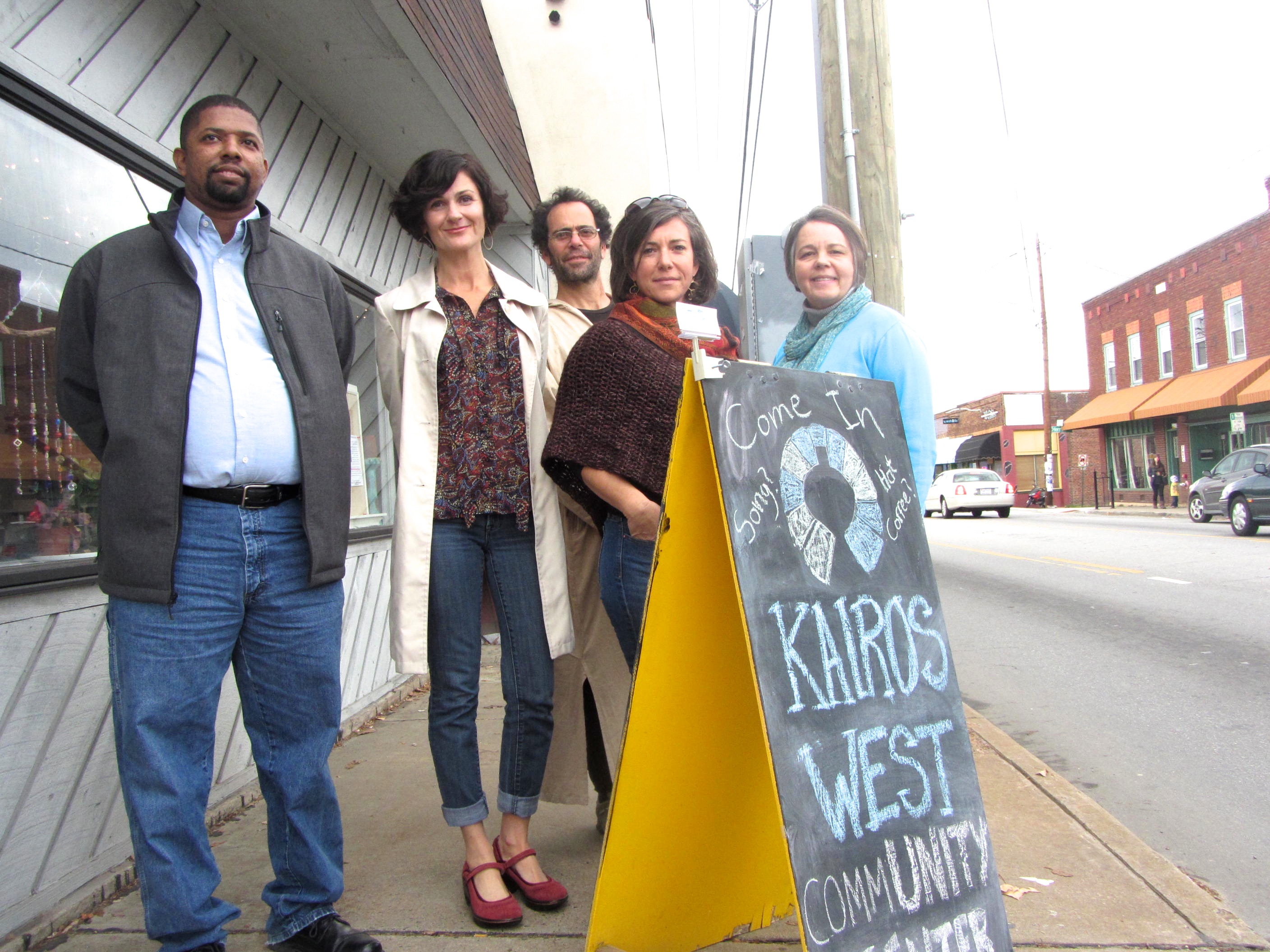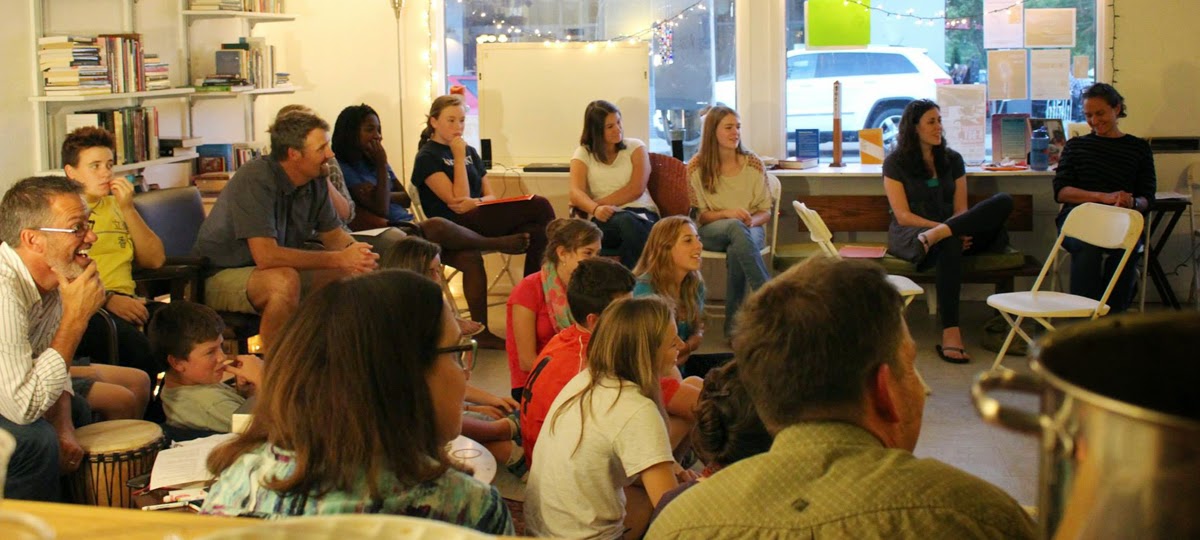This is the fourth in a series of reports on initiatives funded through the budget of The Episcopal Church in its grants to . Acts 8 Moment also has a series of reports on those receiving .

Many churches offer programs extending beyond the parish. But how might churches build real relationships outside our red doors? Kairos West is a new initiative in Western North Carolina that seeks to be the Church in the world. Funded in part by a Mission Enterprise Zone grant from The Episcopal Church, they are creating a community space that is dedicated to, and steeped in, relationship and community building in order to offer a visible and practical extension of the Church.
As a new work of the Asheville’s Cathedral of All Souls and the Diocese of Western North Carolina, Kairos West Community Center in West Asheville is a sacred space in a secular world. Accessible to all and set apart for community building, Kairos West helps empower emerging local leadership through art, liturgy, and social service in the spirit of Jesus.
 The $20,000 Mission Enterprise Zone grant, which was matched locally, enabled the community center to open the doors of its space at 742 Haywood Road in June 2014, as well as create a website and begin hosting gatherings of volunteers and leaders. The cost of the project is actually quite minimal. With no staff costs, the funds raised through grants and donations cover the expenses so the center can offer use of its space for free to groups that fit the mission of Kairos West.
The $20,000 Mission Enterprise Zone grant, which was matched locally, enabled the community center to open the doors of its space at 742 Haywood Road in June 2014, as well as create a website and begin hosting gatherings of volunteers and leaders. The cost of the project is actually quite minimal. With no staff costs, the funds raised through grants and donations cover the expenses so the center can offer use of its space for free to groups that fit the mission of Kairos West.
The Rev. Milly Morrow, Canon Missioner for the Cathedral who has overseen the work, says, “Being commerce-free is a core tenet of Kairos West Community Center. We create space where we subvert the tendency to relate to each other through commerce (the buying and selling of goods and products) and instead make relationship our valued currency.” She adds, “We feel in this way we rid ourselves of many barriers to being truly present with each other and allow for the work of the Spirit to be manifest through our common work for justice and mercy.”
 Kairos West Community Center exists to be a place of “radical welcomeâ€. With representation from multiple denominations and a central location, Kairos offers a neutral, open meeting ground and place for collaboration across sub-cultural, socio-economic and racial lines. Since launching, Kairos has partnered with 16 groups that now use the space, including the Asheville Radical Mental Health Collective, Asheville Youth Mission, Soulspeak youth poetry collective and Asheville Transformers (advocacy and support for the trans community in Asheville). It has also collaborated with Hillcrest Apartments in an early voting March and Roll to the Polls, held a vigil for Ferguson, Missouri, and launched ongoing free food markets and potlucks.
Kairos West Community Center exists to be a place of “radical welcomeâ€. With representation from multiple denominations and a central location, Kairos offers a neutral, open meeting ground and place for collaboration across sub-cultural, socio-economic and racial lines. Since launching, Kairos has partnered with 16 groups that now use the space, including the Asheville Radical Mental Health Collective, Asheville Youth Mission, Soulspeak youth poetry collective and Asheville Transformers (advocacy and support for the trans community in Asheville). It has also collaborated with Hillcrest Apartments in an early voting March and Roll to the Polls, held a vigil for Ferguson, Missouri, and launched ongoing free food markets and potlucks.
 Co-founder Bill Buchanan explains they are not “marketing†to a particular culture nor prescribing what culture should look like — they’re simply catalyzing initiatives and individuals in this community that are meeting those human needs.
Co-founder Bill Buchanan explains they are not “marketing†to a particular culture nor prescribing what culture should look like — they’re simply catalyzing initiatives and individuals in this community that are meeting those human needs.
“The church’s job is to remind us that we are actually subversive; we need to bring about justice and mercy and love,” adds Morrow.
Among the sacred uses of the space, a group gathers on Tuesday and Thursday mornings at the Center for Morning Prayer. They chant the prayers and psalms in a service no longer than thirty minutes that allows participants to move into the rest of their day renewed by common prayer.
 The group is denominationally diverse. In his role as associate minister of St. Paul Missionary Baptist Church, Kairos co-founder The Rev. James Lee pastors a largely aging congregation. “If we continue to do church in the same way, it will be a dead church,†he says. “And the black church, as far as being a vibrant part of the African-American community, will no longer exist. What will that mean for the church, and what will that mean for our community?â€
The group is denominationally diverse. In his role as associate minister of St. Paul Missionary Baptist Church, Kairos co-founder The Rev. James Lee pastors a largely aging congregation. “If we continue to do church in the same way, it will be a dead church,†he says. “And the black church, as far as being a vibrant part of the African-American community, will no longer exist. What will that mean for the church, and what will that mean for our community?â€
For Lee, church buildings can actually divide the community as we gather together with people of similar socio-economic or ethnic backgrounds that do not reflect the community. Kairos then serves as a place that multiple faiths, non-faiths and diverse cultures can gather to further the common cause of justice and community empowerment.
 All of the emerging leaders that hold gatherings at Kairos West commit to the core mission, offering their gatherings free of charge and they themselves do not get paid for the work they do at the center. Kairos West in turn supports the leaders with spiritual direction, access to resources for learning, free space and opportunities to build community together and network and organize.
All of the emerging leaders that hold gatherings at Kairos West commit to the core mission, offering their gatherings free of charge and they themselves do not get paid for the work they do at the center. Kairos West in turn supports the leaders with spiritual direction, access to resources for learning, free space and opportunities to build community together and network and organize.
Asked what she has learned through the process of founding the community center, Morrow says, “If I were to begin again, I would have a more diverse core group (age, race, denominations, class, gender, ethnicity, orientation, and unhoused).” She notes that the time to address this is not after the mission statement is written and the grant has come in, but from the very outset.
 “The church is, first, the body of Christ,†says Morrow. “The people gathered in remembrance of Christ and Christ’s work in their world. And it’s for us to continue that — which is work of justice and mercy. We as humans don’t always prioritize justice and mercy, and so it is this constant need to subvert that human tendency for commerce, for gaining wealth and power.â€
“The church is, first, the body of Christ,†says Morrow. “The people gathered in remembrance of Christ and Christ’s work in their world. And it’s for us to continue that — which is work of justice and mercy. We as humans don’t always prioritize justice and mercy, and so it is this constant need to subvert that human tendency for commerce, for gaining wealth and power.â€
For Morrow, Kairos West is an experiment and it will take some time to assess whether it meets its stated purpose. She says, “It may be that it is a great service to the community for three years and then the energy needs to move on, or it may be at 742 Haywood Street for the next fifty years.” She adds, “As long as we are needed, we will do the work to remain open.”
Kairos West Community Center is a bold experiment, serving as a subversive catalyst for the Gospel beyond the walls of the Church. This empowering of the emerging leader is grounded in Christ’s call to equip the Saints for the work of justice and mercy in our broken world.

This is absolutely WONDERFUL! I love all of what is happening there!